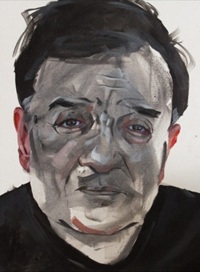
Carlos Nicolás Flores has enjoyed a rich and varied literary life, first as an English professor, then as a Chicano activist, and finally as a writer.
After reading Bless Me, Ultima by Rudolfo Anaya in the mid-1970’s, he decided to teach a course on Black and Chicano literature at Laredo Junior College, where he worked as a full-time English professor. “It was my way of bringing Chicano and Black authors to Laredo and contributing to the social and political movement known as the Chicano movement. The course was a first for the college and Laredoans.”
Subsequently, he garnered a National Endowment for the Humanities Fellowship to Dartmouth College in New Hampshire, where he embarked on a nine-month study entitled "A Chicano Looks at a Black: A Comparison and Contrast of Chicano and Black Literature." Upon his return to Laredo, he continued teaching Chicano and Black literature and undertook new projects. In 1977, with a grant from the Coordinating Council of Literary Magazines, he established the Revista Rio Bravo, where he published and promoted luminaries of the Chicano literary movement such as Rudolfo Anaya, Alurista, Angela de Hoyos, Jose Flores Peregrino, and others.
Moreover, he continued writing. In 1990, the short story “Black and White” won 2nd Place in a fiction contest sponsored by the City of Albuquerque's Cultural Achievement Project and Mesa Azul Review. In that same year, another story, "Cantina del Gusanito," won 1st Place in the Sixteenth Chicano Literary Contest sponsored by the University of California at Irvine. The collection became a novel titled Friend of a Minor Poet, which was a finalist in the 2002 Mid-List First Series Award for the Novel and a quarter finalist in a 2003 contest sponsored by FCCJ's First Coast Writers' Festival. Flores's stories have been anthologized in Cuentos Chicanos (UNM Press, 1984); Pieces of the Heart (Chronicle Books, 1993); and others. Other projects included the establishment of the Laredo Philosophical Society, the South Texas Writing Project, and Teatro Chicano de Laredo.
A lifelong resident of the Texas- Mexico border, Flores has had much lived experience to draw from as a writer. In Our House on Hueco, a Silver Winner in the 2006 ForeWord Book of the Year Award, he portrays an impoverished family’s struggle to achieve the American dream. “This book feels like a classic to me,” states Naomi Shahib Nye. In Sex as a Political Condition, a Rabelaisian novel satirizing the cultural wars on the border, he reflects on the male condition in the closing years of the Cold War. “Ambitious, epic, and high energy,” comments Monserrat Fontes.
Equally accomplished have been his essays such as “Mexican Bandit or the Last Intellectual?: Ilan Stavans’ Notorious Raid on the Chicano Literary Canon” (Academic Studies Press, 2019) and “Raquel Valle-Sentíes: Portrait of a Poet, Painter, and Playwright” (University of Arizona Press, 2023). Currently, he is writing the foreword to Perambulations / Deambulaciones: The Collected works of Teatre Chicano de Laredo by Laurence Wensel, to be published by Routledge (Oxfordshire, UK). As founder and director of TCdeL, Flores edited and produced these plays in their original format.
Finally, in his most recent novel, Pillars of Creation: A Quest for the Great Name in a Nietzschean (Atmosphere Press 2025), he portrays a young Chicano’s search for meaning in a world torn apart by violence on the Texas-Mexico border, a postmodern world where God has been declared dead. According to Lily Andrews of Feather Quill Reviews, Flores “ably captures what it means to be stuck between cultures by showing how being Chicano isn’t just about language or heritage, but a constant tug-of-war between belonging and not.”
He lives in San Ygnacio, Texas
Learn more about Carlos and his books here: CARLOS NICOLAS FLORES – NOVELIST, SHORT STORY WRITER, ESSAYIST